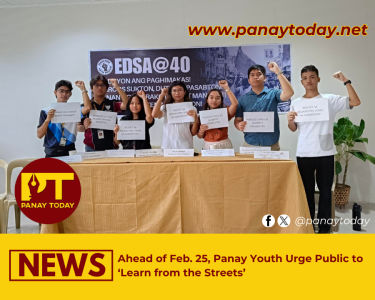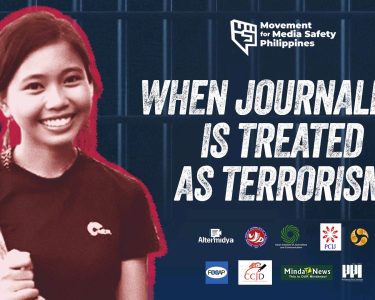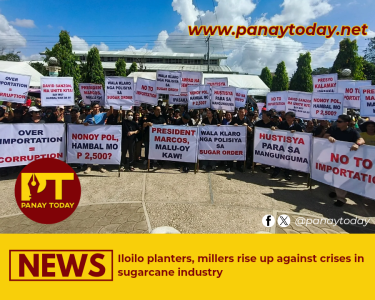LAMBUNAO, Iloilo – More than 200 indigenous peoples Tumandok (Panay-Bukidnon) of an upland village in Lambunao province of Iloilo in Central Panay participated in the 3-day peace mission, last April 6-8, led by the human rights group Panay Alliance Karapatan and the National Union of People’s Lawyers (NUPL).
What seemed to be a peaceful community of Cabatangan surrounded by lush green forests and cool air has been facing martial rule for six months now.
“More than 20 Tumandoks of Cabatangan reported their situation and sought our help last month which led to this peace mission,” said Reylan Vergara, secretary general of Karapatan and the mission’s team leader.
According to indigenous peoples, their village has been placed under unannounced military rule since October last year where curfews are imposed, market items are checked, and farming activities are restricted, said Vergara.
Also joined by the Promotion of Church People’s Response (PCPR) and the indigenous organization TUMANDUK, the peace mission aimed to investigate human rights violations by the military after infiltrating the peaceful village.
A total of 20 different organizations, composed of more than 50 individuals, joined the peace mission, i.e. human rights defenders and lawyers, academe and teachers, church workers, youth and student, urban poor and workers, cultural activists, women and children, peasant and indigenous peoples, fisherfolks, government and health workers, and alternative media outlets.
The 61st Infantry Battalion of the 3rd Infantry Division of the Philippines Army has been using as barracks their barangay hall, day care center and the health center, Vergara added.
Since the deployment of the 61st IBPA in the village, more than 30 families or 180 individuals have fled their homes and sitios to the next village of Bagongbong for safety.
“Worst, many locals were tagged by the military as supporters of the New People’s Army (NPA) or were labeled as rebels themselves and were summoned and interrogated several times. Adults and minors were also used as human shields last February,” added Vergara.
“We want our peaceful village back where we are free to farm and can get home at night safe and sound,” demanded Tay Franco, one of the village Kagawad.
The once serene village of Cabatangan, where the famed 5-hectare lake Tinagong Dagat is located, can be reached on foot for three hours from the adjacent village of Bagongbong or about 80 kilometers from Iloilo City.
The green forests surrounding the village produced ice cold water that flows freely from the mountaintop to the households and even along your way up and down to the village.
The peace mission activities included psycho-social first-aid and human and indigenous people’s rights orientations.
REBEL SUPPORTERS
“I was branded as a New People’s Army (NPA) supporter the reason why I started to flee from home to the next village for me and my family’s safety, leaving my farm, chickens and coffee produce,” said Brian, one of the disturbed villagers from Sitio Tinagong Dagat, about two hours away from the village proper.
“We are no longer free to go to our farm. The military, who said they will be followed at all times, imposed a 12-hour curfew from 6pm to 6am the following day which also cut short our farming days from four to two days now and we are forced to go home early,” he added.
Brian added that during one of their barangay assembly which the military facilitated, the military said that anyone who would be left in the dark could be identified as rebel and be shot.
Another Tumandok, the village’s primary school teacher, has been summoned more than once and interrogated by the military after the village chieftain’s report that she and her husband are NPA supporters.
“My husband and I have been called several times and were forced to admit that we are cuddling the NPAs, giving them shelter and food during their meetings,” said Ma’am Becbec.
The interrogation led by Capt. Gilbert Facunlad and 1st Lt. Ferdinand Devera would go for hours and the questions would be repeated several times while many watchful eyes surround them, she added.
“We have been peaceful for so long which was only disrupted after the military came. They intimidated us and our families, and caused fear, intrigue and division among the community members,” the teacher said.
ZONES OF PEACE
According to human rights lawyer Atty. Pistong Milleza of the NUPL, civilians especially children are considered as “zones of peace”.
“Aside from the Philippine Constitution (which upholds human rights), the Philippines is also a signatory to international humanitarian laws such as the Geneva Convention of 1949 wherein Protocol 2 states the protection of non-combatant civilians in times of civil war or armed conflict,” said Atty. Milleza.
However, last February 4, civilians, including four minors were used as human shield by the more than 20 forces of the 61st IB.
“From Bagongbong, we were blocked and forced by the military to join their column of two-meter distance from each other,” said Toto, 17, whose studying at the said village.
“While we are about to reach Cabatangan proper, we heard gunshots about 200 meters away. After about a couple of minutes when the gunshots have ceased from supposed NPAs, the military continued to fire indiscriminately towards the school building and the barangay hall which continued for about two hours.”
According to the residents, the military exchanged fires at each other, one group staying at the barangay hall, and the other at the day care center.
Bullet holes were later found on the walls of a classroom and the barangay hall. A window pane of the barangay hall was also found broken.
“Meanwhile, we were ordered to dock and prevented to leave the column. My father, who was several meters away from me, continued despite the military’s order and said that he’s not the target so why would he be afraid,” continued Toto.
CHILDREN AS MILITARY TARGETS
Toto was also interrogated by 18 members of the military last December.
“I was about to go home together with other children from school when they blocked and surrounded me while my other classmates were allowed to get through. They asked me repeatedly if I know where the garden of the NPA is.”
The interrogation lasted for more than 30 minutes after Toto repeatedly answered negative to the military’s query.
One resident, who refused to be named, reported that their vaccination one time was held at the village basketball court because their health center was occupied by the military.
“In addition, civilian facilities such as school and religious buildings, barangay halls, houses and other facilities like water system should also be respected during armed conflict. Armed groups should not occupy these facilities, and should not attack or destroy these,” said Atty. Milleza.
Children as young as four to fourteen were very scared and hesitant to tell about their experiences with the military. Facilitated by the Children’s Rehabilitation Center (CRC), the psycho-social workshop was able to release their fear and anxiety through drawings, and later on burning of these fears and stresses.
Furthermore, Lola Rosana reported that her two minor grandchildren were forced to lie of having armed men in their house due to fear.
Upon knowing, the military rushed and entered their house, checked their rooms but found nothing, said Lola Rosana during the workshop.
WE WANT PEACE
The community workshops, where participants were grouped according to their sitios, revealed their emotions of happiness, sadness, fear, and anger.
Roxanne Arsaga of Gabriela Panay and Guimaras who facilitated the workshop said that many were afraid and silent.
“At first, many of the participants were very hesitant and cautious to talk to us. We could see from their faces that they are afraid and somewhat scared as well,” Arsaga said.
“But after a few have said their part, they would race to share their stories and would laugh sometimes. By that time, we knew they were already comfortable with us.”
Arsaga added that the community aired their demand for peace during the workshop.
“They want the military to leave their community,” she said.
“We were happy before because we were able to farm anytime of the day without restrictions. But when the military came and the curfews were set, we were both afraid and angry. We want our old lives back,” said Lola Salvacion, 78, from Sitio Tingig, some 30 minutes from the village proper.
“We are also happy that you have come to us and helped despite the long and arduous travel and hardship,” echoed the community.
DIALOGUE WITH THE GOVERNOR
The Tumandoks of Cabatangan are set for a dialogue with Iloilo Province Governor Arthur Defensor, Sr. on April 19.
“We have requested the governor’s intervention to help our Tumandok. Mayor Jason Gonzales of Lambunao is also expected to attend the dialogue. Representatives from the Commission on Human Rights (CHR), National Commission on Indigenous Peoples (NCIP), and the departments of Social Welfare and Development (DSWD) and Health (DOH) will be invited,” said Vergara.
The group will present their findings and together with the residents of the village, will strongly recommend the pull-out of the military from the community.
The governor also asked for the presence of the military during the dialogue, Vergara added.
The 61st IBPA are numbering from 50-70 in the community. Day before the peace mission, three Rio trucks dispensed military men and were seen in the surrounding area. Some even were in plainclothes found in the village proper mingling with civilians. (John Ian S. Alenciaga with reports from Bryan Bosque and Roxanne Arsaga | www.panaytoday.net)




